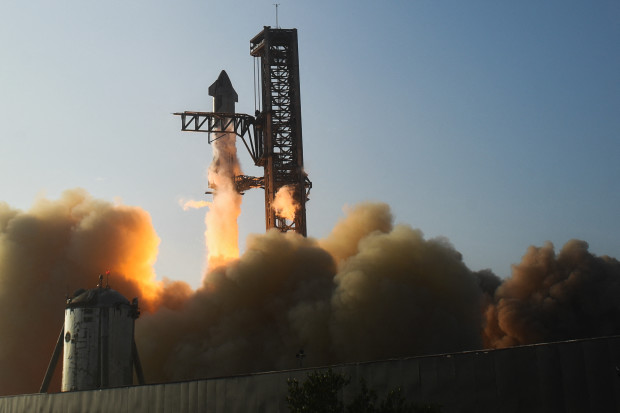
Above all of his many other ventures and hobbies, Elon Musk remains intent on colonizing Mars. To turn this fantasy into something even resembling reality, he and SpaceX have been working on developing an enormous rocket ship called Starship.
The rocket, according to SpaceX, will be the "world's most powerful launch vehicle ever developed." The fully-stacked vessel stands at 120 meters in height (slightly taller than the Saturn V rocket that brought the U.S. to the moon) and has a payload capacity of 100 to 150 tons.
Related: Elon Musk hints at the bold future of SpaceX's Starship program
Musk, sharing a video of the fully-stacked Starship on the launchpad at Starbase Sept. 5, said that the rocket is "ready to launch, awaiting (Federal Aviation Administration) license approval."
But it remains unclear when that approval might be granted.
"The SpaceX Starship mishap investigation remains open," the organization told TheStreet in an emailed statement. "The FAA will not authorize another Starship launch until SpaceX implements the corrective actions identified during the mishap investigation and demonstrates compliance with all the regulatory requirements of the license modification process."
The investigation, which the organization began in April, is standard procedure for the FAA.
When Starship first launched in April 2023, it got off the pad, flying for about three minutes before it lost several engines, forcing SpaceX to destroy the vehicle.
Despite the fiery conclusion to the rocket's brief flight, Musk hailed the test flight as a success, saying that the company "learned a lot for next test launch in a few months.”
"Obviously not a complete success,” he said, “but still nonetheless successful.”

The launch destroyed much of the launchpad, hurling debris across the surrounding environment and setting off 4-acre fire on nearby state park land. A coalition of environmental groups, including the Center for Biological Diversity, brought a subsequent lawsuit against the FAA for allowing SpaceX to launch without properly considering the environmental impact of that launch.
The plaintiffs are in part seeking the retraction of SpaceX's operational license until the FAA writes up an Environmental Impact Statement.
More SpaceX:
- Environmental Groups Make Serious Move After Damaging SpaceX Explosion
- SpaceX Has Some Wild Predictions for the Rest of 2023
- Investor Says $150 Billion SpaceX Valuation Seems Too Good to Be True
Both SpaceX and the FAA have denied most of the suit's allegations in court filings.
Musk said Sept. 4 that once all of Starship's kinks are smoothed out and the program is fully operational, SpaceX will be responsible for delivering more than 99% of all payload to orbit. The company is currently responsible for around 80% of all deliveries to orbit, a number Musk expects to jump to 90% by next year.
SpaceX recently completed a record-breaking 62nd launch for the year.
Get investment guidance from trusted portfolio managers without the management fees. Sign up for Action Alerts PLUS now.







